QuestionQUESTION: I have a 11 month old male American pit bull terrier and he is VERY friendly. Towards all people and strangely enough (for their breed) any other dog or cat. But he's almost TOO friendly.
When walking him he does extremely well walking beside me (we're making lots of progress using a head halter to stop the pulling). But when another dog or person comes along he's shaking with excitement! Since he was about 6 months. We've trained him to sit or lay before greeting ANYTHING. So hes good there.
But once that's over he wants to lunge at the other dog/person. Smell them, roll around with them, lick them. He pulls so hard on his leash it nearly knocks me over. But he NEVER bites. Some of the neighbors won't go near him because hes a pit bull and they think hes aggressive.
I'm not sure what it is. Hes very laid back while at home, almost lazy. An occasional one bark when someone knocks, but after that he's all wags. He loves belly rubs and doing lots of tricks for treats! he plays with our other smaller dog and doesn't mind when the cats rub up on him! And when its just me and him, he loves running around out in an open field we have near our house, playing fetch. So he gets lots of exercise. He just wants to PLAY really badly with anything. Now for my question (finally)..
What can I do to correct this? Will getting him neutered help? Is it just his personality? Will I always have to worry about him possibly hurting a smaller dog/person because he doesn't know how rough he plays?
I don't want to have to stop bringing him out for long walks or avoid people/dogs for the rest of his life :(
ANSWER: Hi, Jenna,
Thanks for the question.
We see this a lot in pit bulls. It's a form of social anxiety where when the dog feels nervous socially he overcompensates. It usually starts with the oral development phase the dog goes through as a young puppy (which ends at about 6 mos.). Neutering will probably not do anything to change this behavior and actually might make it worse. There's evidence suggesting that neutered dogs exhibit more fear and aggression than intact dogs do. On the other hand if your dog were to meet another intact male who took a dislike to him, things could get nasty pretty quickly. So it's kind of a toss up as to what's best in this regard.
How old was your dog when you got him? How old was he when he left his mother and littermates (if you know)? Do you ever play tug-of-war with him, and if not, why not?
By the way, even though the head halter seems to have brought good results in terms of his walking without pulling, it might also be causing a build up the emotional pressure he feels about wanting to meet other dogs; think of it like putting a lid on a pressure cooker, but without an escape valve--that's a lot of energy with no place to go. Teaching him to enjoy walking next to you, to make it feel just as satisfying as pulling like mad, would be a better way to go because if he feels that his energy is being plugged into you, and that feeling is satisfying to him, he won't need to pull toward other dogs, etc. Does that make sense? In other words instead of teaching him to walk next to you by restricting his head movements, etc., it's better to teach him that walking to you satisfies some inner need. That way when he sees another dog he won't go overboard. (I know I'm not giving you an alternate training tool or technique for walking him yet, but I want to get a little more information first.)
What's his name? Do you live in a city, suburbs, small town, or the country? Have you ever used a tennis ball as a reward for learning commands instead of treats? Do you think you could try that? Treats are fine but often times with a high energy dog you'll get much better responsiveness and obedience when you use a high energy game as part of your training repertoire. Plus if you train him to obey while he's in a highly energized state it'll be easier to get him to listen when he gets into a similar state on his own. Make sense?
I look forward to hearing back from you.
LCK
---------- FOLLOW-UP ----------
QUESTION: He was about 6 months when my family got him. I have no clue how old he was when he was separated. And his name is Bo :)
Another thing with the head halter is I don't want him pulling the leash from my hand when he pulls me. That happened once and he ran up to a person who had a pug. Of course, he sat down like he was taught to do but the guy made it worse by picking up the pug and lifting it above his head. Oh boy. That put Bo in play mode, he was jumping up and leaping around like crazy. Not good.
I play tug-of war with him nearly everyday, he really likes it. He knows "drop it" so if he ever gets a little playful growl in, I put it up. Thats alright, right?
We kind of live in the suburbs. And we live in a condo so I have to walk him many times a day to get his exercise. And I sometimes use a stuffed dinosaur that he loves to carry around and play with as I reward. But not as often as I use treats.
AnswerThanks for the further info. My advice might seem a bit different from what you're expecting so I'm going to first go into some important background information that I think is crucial.
Puppies are designed to explore the world through their teeth. The dog's teeth and jaws are important tools for defending themselves from harm and eventually for hunting for a living. Since most dogs aren't in a position where other animals could come along and kill them, or where they have to hunt in order to eat, most people don't see the importance of these natural instincts relating to biting. But just because a dog gets his food in a bowl and lives in a house with doors and windows doesn't mean he doesn't have drives, impulses, and instincts that are directly related to biting other animals who might harm him, or the kind of animals that would make a good dinner for a wild dog or wolf.
What probably happened to Bo is that his previous owner got nervous about how oral he was as a pup and squelched those natural and important impulses. One of the results of this kind of training in some dogs is that they develop a kind of out-of-control overfriendliness.
So what can you do?
First it's important to understand the natural model of behavior, and how it's operating in Bo's head and heart. Dogs love people; it's like gravity. They can't resist it. And their love for us is partly due to the long history they have of living with us. But from a natural, genetic standpoint people also stimulate some feelings of nervous tension in a dog. Just by being taller, more vertical, with eyes high above the dog's eyes, a human being naturally stimulates some of the same feelings a wolf has when a large prey animal he's chasing stops running, turns, stands his ground, and stares down at him. A moose or elk could easily maim or even kill a wolf, and on an unconscious level the wolf knows that and keeps his distance. But when a dog sees a human being looking at him from above he might feel some nervous tension unconsciously, but he usually also has a long history of both domestication in his genes and conditioning through past experience telling him that people are good, that they're not going to kill him. (I hope this make sense so far.)
But on a certain level that unconscious feeling of tension and danger is still there when a dog sees an unknown human, and to some extent even when he's interacting with his owners. But one reason dogs have survived to become such an integral part of our lives is that the smarter dogs, way back when, always knew how to turn those feelings of danger and nervous tension to their advantage by wagging their tails, getting wiggly, acting cute, and being friendly.
So going back to the puppy who's had his oral impulses squelched. When a pup goes through his oral development phase without that happening he knows how to sublimate his oral urges into other behaviors without going overboard. There's no internal pressure keeping him from expressing himself by gently mouthing his owner's hand or even by gripping his owner's arm, which is a natural, friendly gesture among dogs. So a dog who's had his oral impulses squelched or punished as a pup has a lot of internal emotional pressure building up inside of him and his behavior tends to be over the top and too energetic due to the build up of that pressure.
Now when a dog sees another dog he's also usually very friendly, but for a different reason. Dogs play together, which opens up the opposite polarity of the problem dogs have relating to humans, which is that on a certain level humans feel like predators to a dog. But other dogs feel more like play partners, which means they get to take turns being the prey and predator: "You be the wolf and I'll be the deer." This not only burns off a lot of a dog's energy and internal tension, it has lots of other effects (see the article on Play Benefits below). But remember that for a dog the primary focal point for either polarity, deer or wolf, is always the teeth and jaws. Other than their hearts (which are the focal point of love), their teeth are their most important body part, emotionally speaking.
Okay, so what I'd like you to try with Bo is playing a lot of tug-of-war with him, always let him win, and praise him enthusiastically for winning. I want you to get him to the point that just seeing the tug rag makes him sit and wag his tail in a kind of avid anticipation of a game.
The next step is to take his natural ability to learn things and make it into a game where if he obeys a command like "sit," or "down," or "stay," or "heel," he gets to bite the tug toy. Remember biting is one of the most important aspects of his life. The more he gets to bite a toy in a play, and the harder he does it, and the more INTO IT he gets, including the play growl (which you should never squelch, by the way), the happier and more emotionally balanced he'll be.
So here are some helpful links (I know it's a lot of homework, but I can tell you love Bo an awful lot so I'm sure you won't mind reading this stuff):
http://www.tiny.cc/tug (written by la Neil Sattin)
http://www.tiny.cc/MythofTug
http://www.tiny.cc/playbenefits
http://tiny.cc/TheEyesHaveIt (I really recommend you do this exercise--it'll calm him down a lot.)
http://www.tiny.cc/ChaseSquirrels (This one's about redirecting a dog's energy back to his owner.)
http://www.tiny.cc/StopPuppyBites (Bo's previous owners should have read this.)
http://www.tiny.cc/RedirectEnergy (Another Neil Sattin article.)
http://www.tiny.cc/walkingonleash (Should be titled "How to Avoid Using a Head Halter.")
If you have any questions or problems don't hesitate to get back to me.
LCK

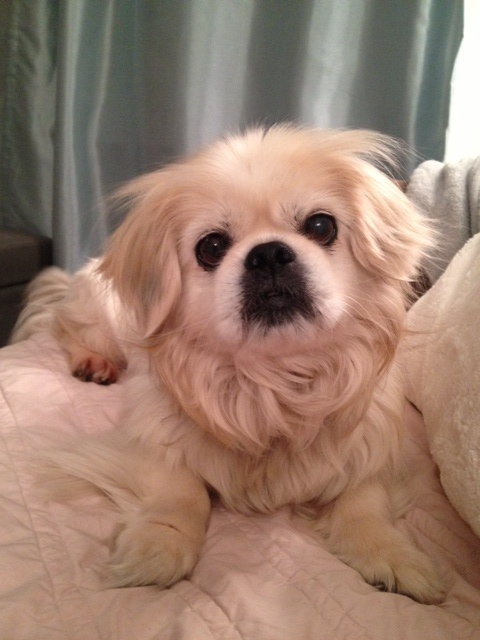 Nightmares?
Question
Beethoven
Hi Melissa, Ive had my very h
Nightmares?
Question
Beethoven
Hi Melissa, Ive had my very h
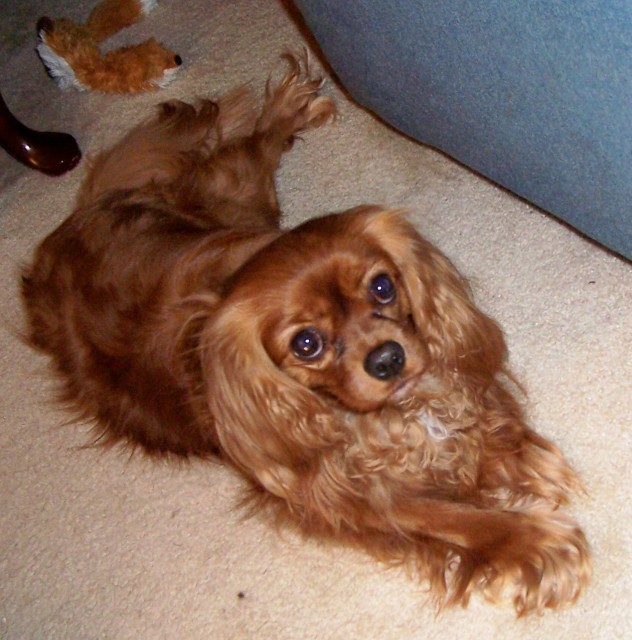 Dog light and shadow chasing
Question
Jenni
My 3 year old Cavalier King Charles Span
Dog light and shadow chasing
Question
Jenni
My 3 year old Cavalier King Charles Span
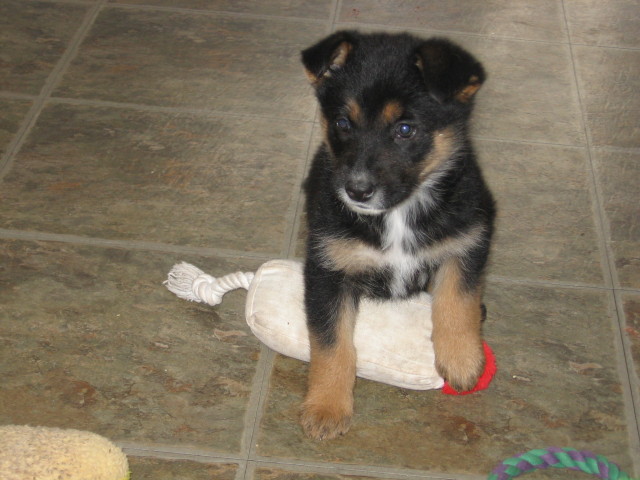 puppy problems
QuestionQUESTION: I am the proud owner of 2 german shep
puppy problems
QuestionQUESTION: I am the proud owner of 2 german shep
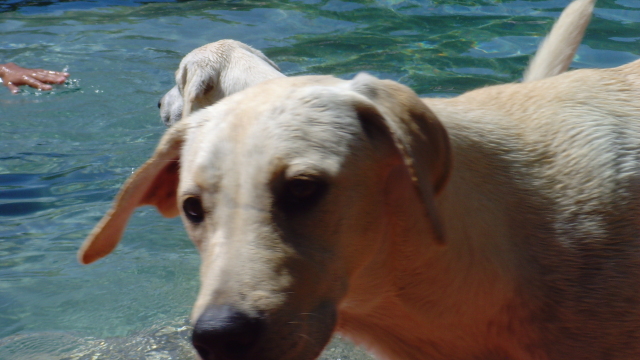 Psychological trauma
Question
Izzy
I recently took my 1 year old dog to a fr
Psychological trauma
Question
Izzy
I recently took my 1 year old dog to a fr
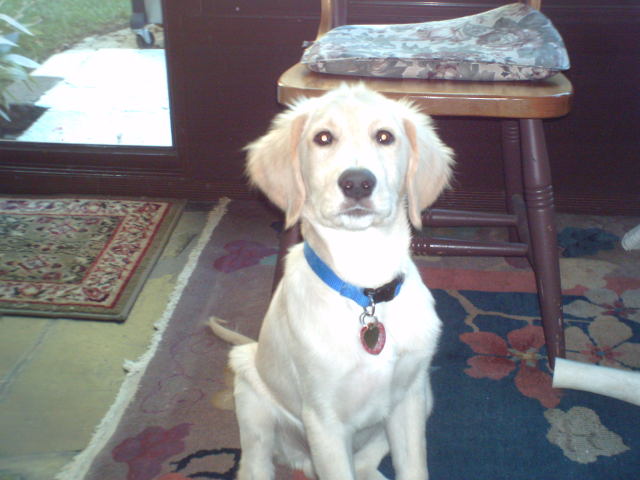 my 7 month old golden changed for the worse
QuestionRiley at 6 months
QUESTION: I got a gold
my 7 month old golden changed for the worse
QuestionRiley at 6 months
QUESTION: I got a gold